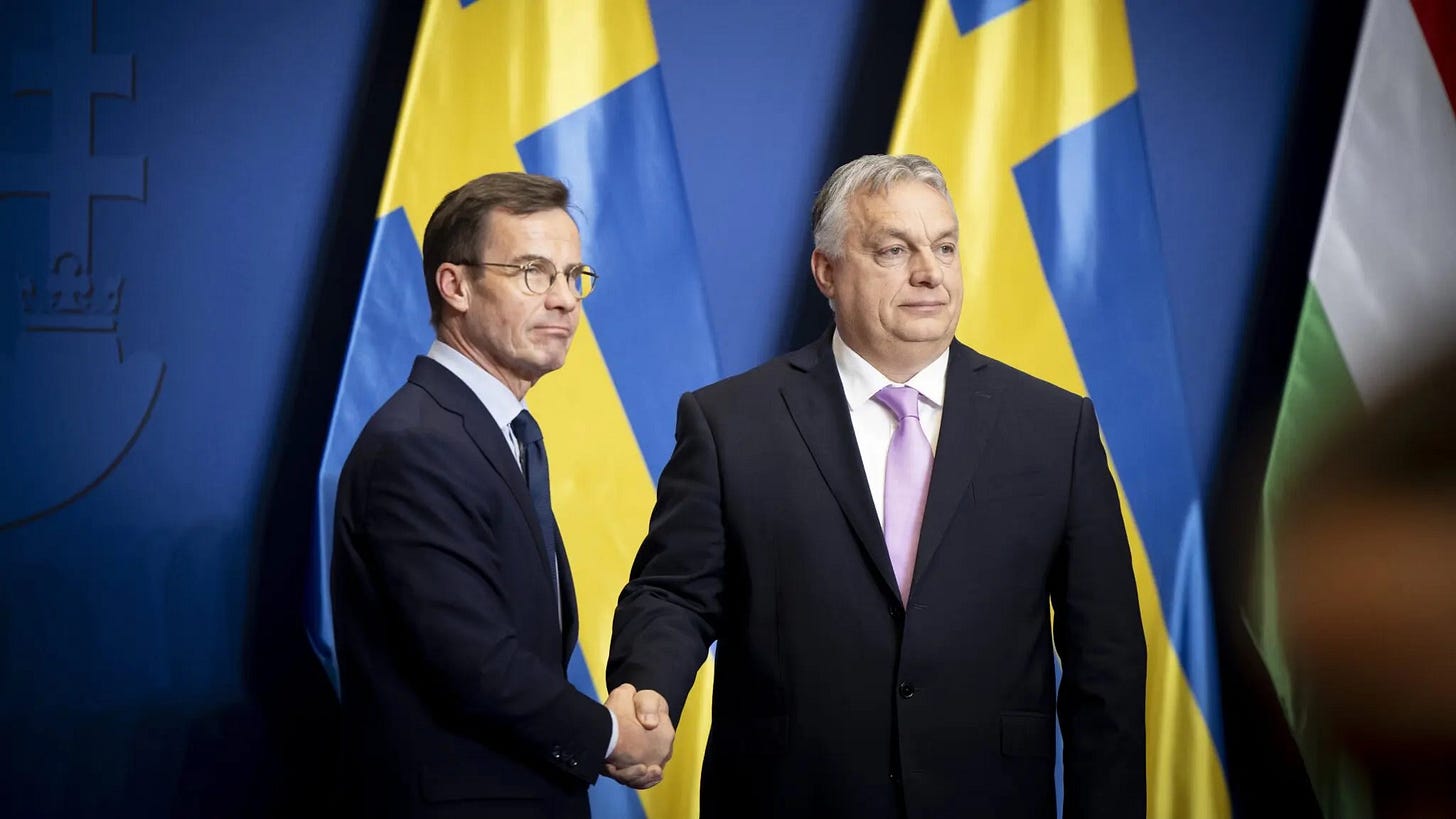Credit: MTI
Sweden’s Ulf Kristersson and Hungary’s Viktor Orban.
Today, finally, almost two years after Sweden’s NATO-application, did Hungary, as the last member country, approve Sweden’s membership in the Western defense alliance.
For Sweden, it was truly a historic day, as it was for the four other Nordic countries, all of them now NATO-members. With that, the military and security situation in northern Europe has radically changed. Russia is now facing a united NATO front along its western border, and the Baltic Sea is on all sides surrounded by NATO-members, with the narrow inlet to the Russian city of St Petersburg and the small Russian enclave of Kaliningrad as the only exceptions.
That’s most likely not the outcome Vladimir Putin desired, or even foresaw, when he launched his war on Ukraine two years ago. That invasion, and that war, became the final straw for neutral Sweden and Finland to join NATO.
“A historic day,” said Sweden’s prime minister Ulf Kristersson, a comment repeated by many not only in Sweden, which now, after 200 years of neutrality -- a policy that saved the country for being drawn into World War II in contrast to all its Nordic neighbors -- has joined the Western defense alliance.
“We are more secure now as a member of NATO,” said opposition leader, Magdalena Anderson, of the Social Democrats. Anderson, then as prime minister, started the membership application process shortly after Russia’s invasion of Ukraine, “a war,” she said today, “Russia must not win.”
And NATO secretary general, Norwegian Jens Stoltenberg, proudly announced the successful end-of-the-road for his Nordic neighbor, declaring that Sweden is now “safer” and NATO is now “stronger.”
It was an unseemly delay by Hungary, as it stalled in conjunction with Turkey’s prime minister, Recep Erdogan, the Swedish application. Only in late January this year did Turkey finally approve Sweden’s membership. By then, Orban and Erdogan had already last year approved Finland’s application, but their approval of Sweden came well over a year after the 28 other NATO members had said yes to Swedish membership.
The Erdogan/Orban delay action infuriated political leaders in Europe and in the U.S. What did the two get out of this? Well, Erdogan, finally, was allowed to purchase 40 U.S. F-16 fighter jets while Orban’s yes paved the way for four additional Swedish Gripen fighter planes for Hungary’s air force. But their delay tactic will not produce good will.
Here were two leaders of, mildly put, troubled democracies, finding faults with two of Europe’s leading examples of democratic openness and debate. It did not sit well with many. For Orban, in particular, whose country is also a member of the European Union, his delay action could lead to future friction and problems. His authoritarian tendencies were already seen as deeply worrisome, and his coziness with Putin, as the Russian leader’s closest ally in Europe, was regarded with deep skepticism and uneasiness.
I met Viktor Orban many years ago, in March of 1990, at a huge election rally with the Young Democrats (FIDESZ) at the Nemzeti sports arena in Budapest, in the run-up to Hungary’s first free and democratic elections in the post-Communist era in Eastern Europe. Those were exciting and enthusiastic days, and Orban, then a 27-year-old law student and active in the student dissident movement, symbolized much of that excitement and enthusiasm.
“The existence of FIDESZ is a particular Hungarian phenomenon,” said Orban. “We are not linked to the Communist past. We are clean. And we are regarded as honest.”
But in the highly fragmented parliamentary elections that spring, FIDESZ received only 5.4 percent of the vote and 21 seats in the new legislature, barely reaching the four percent threshold. Today, FIDESZ is still led by Orban, prime minister since 2010 with a huge parliamentary majority, an undisputed, authoritarian leader of a nation, having moved to the right, shifting to what he has called an “illiberal democracy,” and where, many see, serious democratic backsliding taking place.
Today, Viktor Orban is, also, the leading Trumpist of Europe, declaring in his recent State of the Nation speech:
"We cannot interfere in other countries' elections, but we would very much like to see President Donald Trump return to the White House and make peace here in the eastern half of Europe. It is time for another “Make America Great Again” presidency in the United States. We ourselves are preparing for a presidency. I am talking about the Hungarian EU Presidency. Make Europe Great Again! Over there MAGA, over here MEGA."
This summer, Orban’s Hungary will assume the rotating EU presidency for six months. What will that mean, for Europe, and for Ukraine? All I can say is: Europe -- beware!





Thank you Klas for your article on Swedens membership into NATO and hold out from Hungry and Turkey in exchange for military hardware. My first thought was who really wants and benefits from receiving high tech military equipment? Reverse engineering to catch up and find vulnerabilities within the systems ? Creating a dependency of Swedish and American military capabilities ? Regarding Orbans liberal beginnings to a hardcore right winger in order to stay in power is a common trait in many Nations now first here in USA with NAFTA then later with Globalization to pitch laborers against each other in order to maximize the profits to a few. I say follow the money and you will find most answers to any conflict after Religious doctrine of course pushed to the masses. Klas I can only imagine the inner workings you have experienced through out your career and life from a humble Swedish being. We live in a very complex and on the other hand simple world as consumers turned into commodities to be traded by a few…. Very happy to have you in my live
Thanks for sharing the scary Orban speech. Not much talk about i a Sweden which sold 4 fighter jets to Hungary.